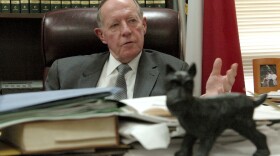The North Carolina General Assembly has passed legislation to reconfigure the state elections board.
Governor Roy Cooper, a Democrat, successfully sued top Republican lawmakers over the board's current makeup. A court ruling in October said lawmakers sought to usurp the governor's executive authority when they drafted a 2017 law, just before Cooper took office, that took away the governor's appointment power over a combined, nine-member elections and ethics board.
The court stayed that ruling, however, until the end of the month pending an elections board investigation into vote tampering with absentee ballots in North Carolina's ninth congressional district.
Meanwhile, the new elections board legislation would return a stand-alone elections board to a five-member makeup consisting of gubernatorial appointees, effective January 31, 2019.
It also would require a new primary if the current elections board investigation leads to a do-over in the ninth congressional district race.
"It is current law that you start over, that you have filing, you have a primary, you have a second primary if needed," said Rep. David Lewis (R-Harnett), addressing the senate rules committee before the elections board measure was taken up, and passed, by both chambers on Wedneday.
State law does require a new primary when the governor issues a writ of election to fill a vacancy in North Carolina's congressional delegation.
The new legislation also would tighten rules around submitting absentee ballots, including requiring an absentee voter to have their application notarized, or, have the two required witnesses, in whose presence a voter marked their absentee ballot, certify the identity of the absentee voter.










